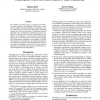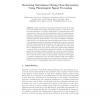123 search results - page 11 / 25 » Intelligence Analysis Using Quantitative Preferences |
111
click to vote
AAAI
2006
15 years 3 months ago
2006
We establish a declarative theory of forgetting for disjunctive logic programs. The suitability of this theory is justified by a number of desirable properties. In particular, one...
146
click to vote
IJBIS
2010
14 years 11 months ago
2010
: The increasing intensity of global competition and the rapid advances in information technology (IT) have led organisations to search for more efficient and effective ways to man...
149
click to vote
CEC
2011
IEEE
14 years 2 months ago
2011
IEEE
—Constrained Genetic Programming (CGP) is a method of searching the Genetic Programming search space non-uniformly, giving preferences to certain subspaces according to some heur...
110
Voted
AAAI
2007
15 years 4 months ago
2007
Over the past half decade, we have been exploring the use of logic in the specification and analysis of computational economic mechanisms. We believe that this approach has the p...
115
Voted
IEAAIE
2009
Springer
15 years 9 months ago
2009
Springer
Many researchers in the HRI and ECA domains try to build robots and agents that exhibit human-like behavior in real-world close encounter situations. One major requirement for comp...


